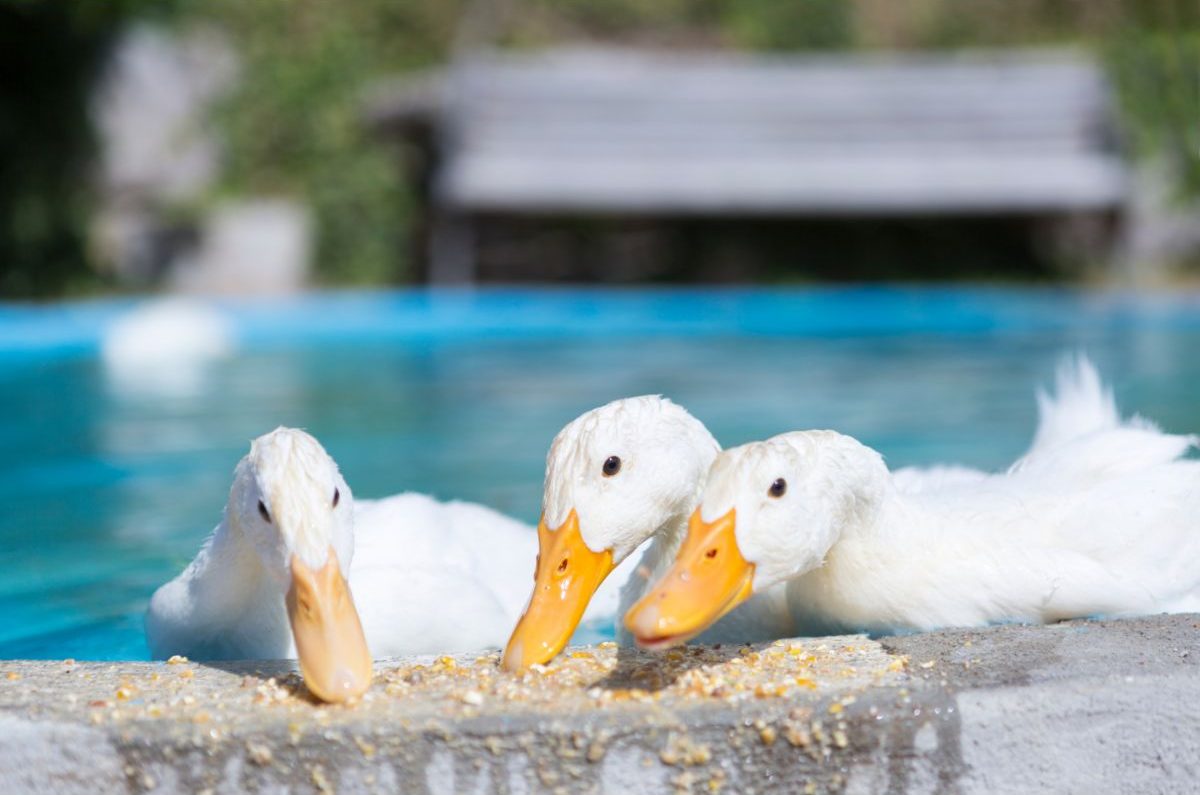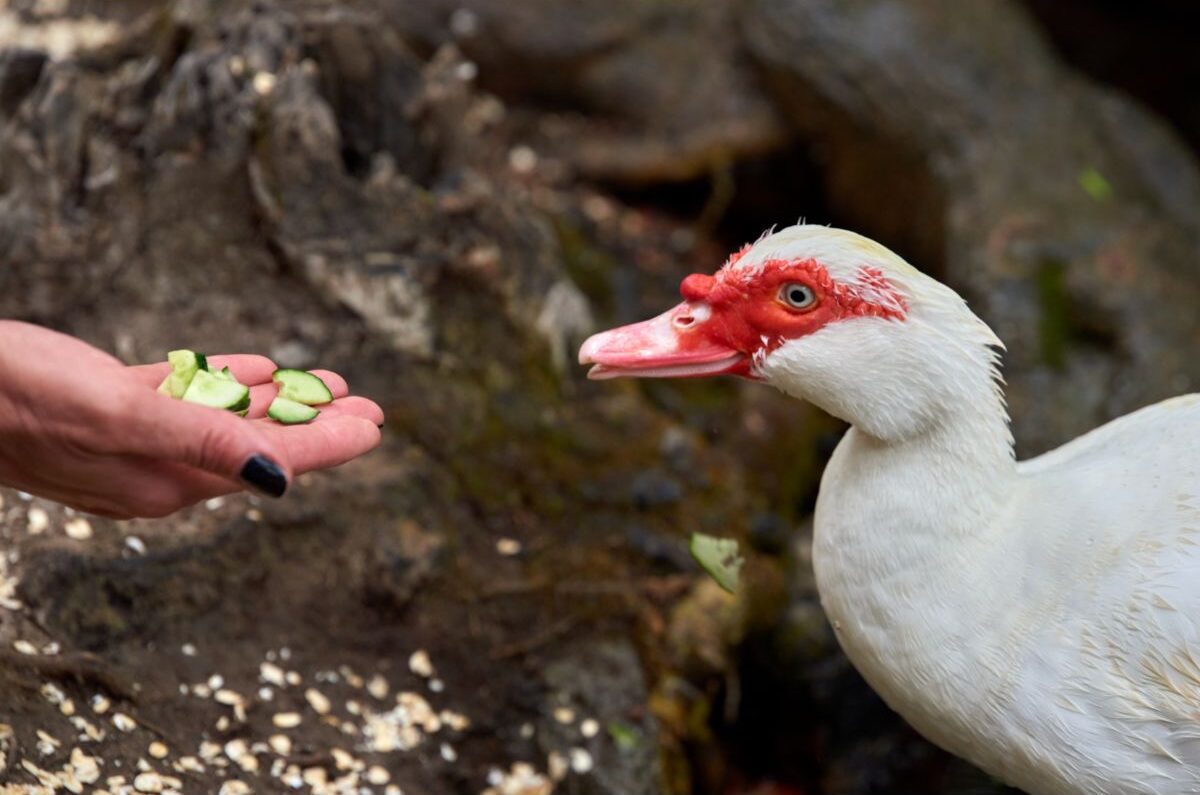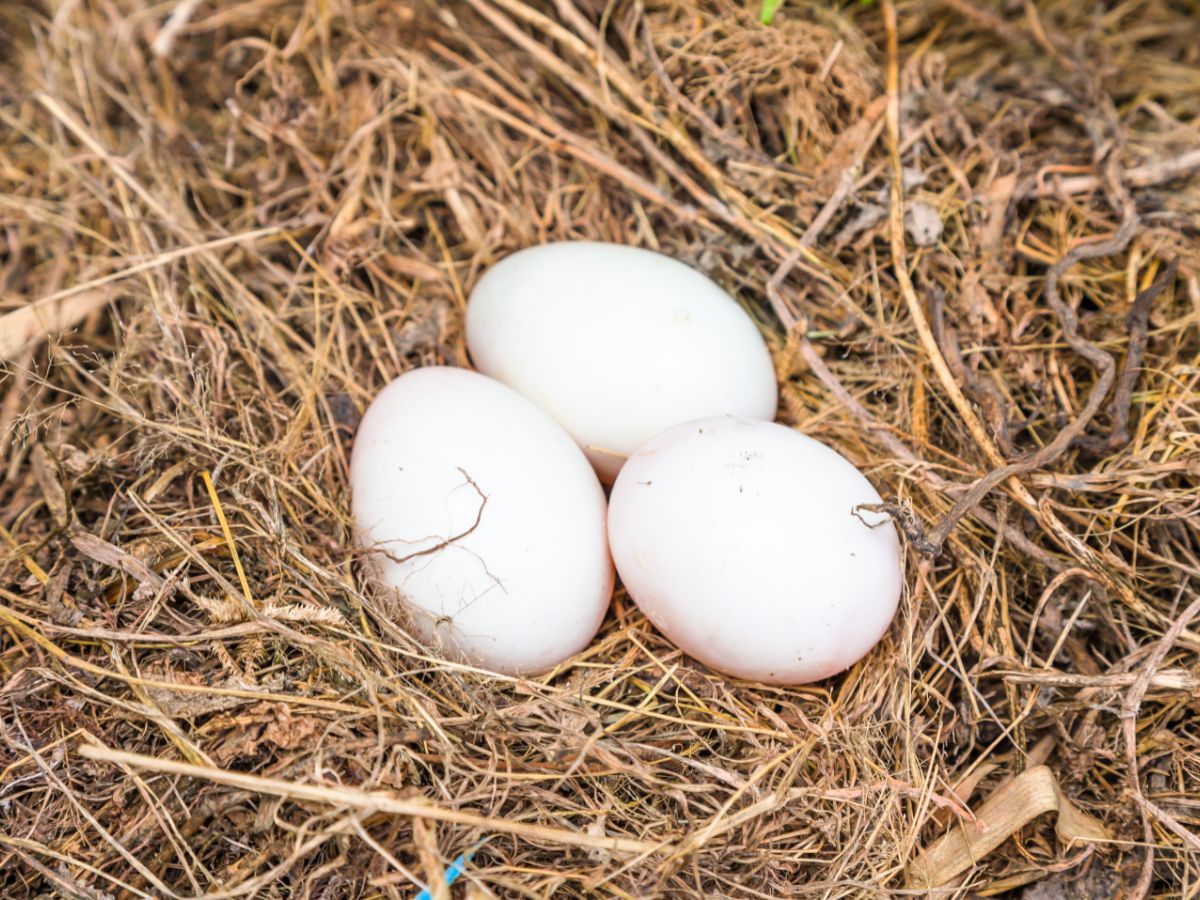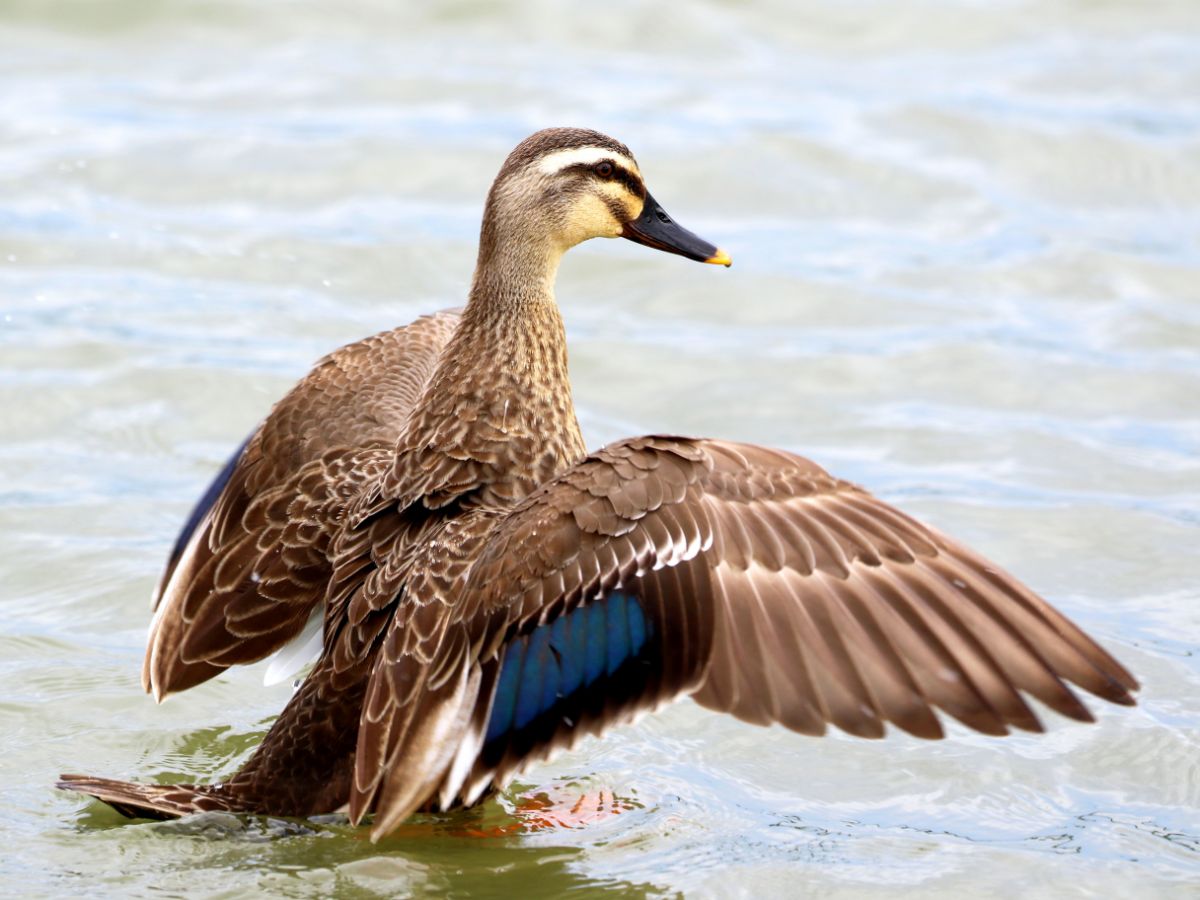You may have grown up feeding bread to wild ducks in the park, but now that you’re older, you know that bread is not an ideal food for ducks. If you’re keeping ducks in your backyard, you may wonder what foods make the best diet for them to thrive. So what foods are best to feed backyard ducks?
Feed backyard ducks an age-appropriate commercial feed and supplement it with greens and other treats. Ensure they have plenty of water to dabble. If giving chicken feed to ducklings, supplement niacin. Give calcium supplements to laying ducks. Letting ducks forage helps them get good nutrition.
Providing a diet for your backyard ducks that mimics their natural diet helps them to thrive and produce plenty of eggs. You want to ensure you give them a variety of foods that will provide them with the full range of nutrients they require.
Contents
The Best Food For Ducks Mimics Their Natural Diet
| Protein content | Other additives | |
| Ducklings younger than 3 weeks | high protein content – 18-22% | 10 mg niacin (vitamin B3) per day |
| Ducks between 3 and 20 weeks old | 16 to 18% | 10 to 12,5 mg niacin (vitamin B3) per day |
| Ducks older than 20 weeks | at least 16% | 12,5 mg niacin (vitamin B3) per day |
| Laying Ducks | at least 16% | additional calcium 3% 12,5 mg niacin (vitamin B3) per day |
| Older Ducks and Drakes | 14% | 12,5 mg niacin (vitamin B3) per day |
Ducks are omnivorous birds that eat weeds, seeds, grains, slugs, insects, snakes, frogs, and mollusks in the wild, which provide all the vitamins, minerals, protein, and calories that ducks require for healthy growth and development. The best foods to offer your backyard ducks mimic these natural ingredients to provide a well-balanced diet.
Of course, free-ranging ducks will tend to fill up on these nutritious wild foods as they forage.
When feeding your ducks, you can either use a commercially-prepared feed specifically formulated for waterfowl or use chicken feed plus appropriate supplementation to provide for ducks’ particular needs. The feed you supply should be age-appropriate, as different life stages have specific nutritional requirements.
Give supplemental greens, fruit, protein foods, and calcium sources to round out your ducks’ diet. Ensure that you supply clean water near to the food. You must change this water daily, as ducks quickly foul their water.
Ducks feed by grabbing food such as bugs, worms, or water weed with mud and swishing it around in the water. They need water at hand to replicate this behavior in your backyard and could easily choke otherwise.
Ensure that you give foods with the correct protein percentage for that life stage, as too little or too much protein can cause growth problems.
Angel wing, also crooked wings is an example of a disease that can be caused by improper nutrition in ducks and geese. Here, the wing feathers grow twisted and point outward like a saber.
The cause is a diet that is not appropriate for ducks, with too much calories and protein, and at the same time a lack of vitamin D and E, for example when waterfowl are fed a lot of bread.
Birds with angel wings are unable to fly, but the malformation can usually be treated with the right diet in young birds and regresses.
When giving chicken feed to ducks, only give unmedicated feed. Ducks are resistant to many avian diseases, while the medicines used for chickens are often toxic for ducks.
Food For Ducklings Younger Than Three Weeks
Feed ducklings younger than three weeks with duck starter crumbles*, as they have a high protein content (18 to 22 percent) and sufficient niacin to support the rapid development of ducklings’ bones. It’s best to avoid chicken feeds at this stage, as they are deficient in some nutrients that ducklings require.
If you must use chicken feed, supplement with protein foods such as earthworms and slugs, and provide extra niacin by adding 5 percent brewer’s yeast to your ducklings’ food.
Food For Ducklings Between 3 And 20 Weeks
When ducklings are between 3 and 20 weeks, feed them a high-quality grower food designed for waterfowl or chicks, with a protein content of around 15 percent.
Food For Ducks Older Than 20 Weeks
When your ducks are 20 weeks and older, feed them a high-quality layer food, either waterfowl pellets* or mixed grains for chickens – this is also suitable for laying ducks. An adult duck will eat 4 to 6 ounces of feed a day depending on the season; in summer, they can get more food by foraging so that they will eat less feed.
You should provide them with a calcium supplement at this life stage to ensure the development of strong eggshells. Feed your ducks crushed eggshells or oyster shells. Provide this supplement in a separate container so that each duck can eat according to their needs. If you want to know how duck eggs taste and differ from chicken eggs, you can read this article.
Supplemental Foods For Ducks
Leafy greens, green vegetables such as peas, cucumber, and zucchini, corn kernels (in moderation), vegetable peels, fruits such as sliced tomatoes, strawberries, smushed blueberries, chunks of watermelon, and halved grapes, and protein foods such as earthworms and shrimp shells make good supplemental foods for ducks.
Put the greens into a water bath to keep them from wilting. Ducks feed by grabbing food in their beaks and swishing it around in the water, so a water bath will meet with their approval, allowing them to dabble for their food to their hearts’ content.
Cut greens with long fibers, such as grass, into sections to prevent your ducks from getting impacted crops. Ensure that ducks have access to grit (coarse sand or dirt) to help them grind food in their gizzard – this is how they chop food smaller, as they don’t have teeth. If your ducks are free-range, they will provide themselves with the grit they need.
No more than 10 percent of your ducks’ daily food intake should be treats, except for green leafy foods such as kale, weeds, and chopped grass.
Good treats for ducks are:
- Mealworms* and crickets
- Earthworms*
- Herbs, such as basil, oregano and rosemary
- Fruits and berries, such as blueberries, watermelons and bananas
- Vegetables, such as zucchinis, broccoli, carrots and cabbage
Introducing Ducklings To Treats
Introduce your ducklings to treats early to encourage them to eat a variety of foods. Ensure that you give them grit, as they are not yet free-ranging. Dice, grate, or puree foods before offering them to your ducklings, making them more likely to accept them.
Give food ad libitum to ducklings in the first eight weeks of life and after that, feed them twice a day – early in the morning and early in the afternoon.
Foods To Avoid Giving To Ducks
You should avoid giving certain foods to ducks for various reasons.
Bread has low nutritional value and can cause ducks to suffer from malnutrition and obesity (due to the high-calorie content). The poor dietary value will harm ducklings’ growth and development. Also, leftover bread may be moldy and potentially fatal to your ducks.
Do not feed other high-carbohydrate, low-nutrient foods such as popcorn and crackers. Crackers are also too salty. Do not feed onions, garlic, or chocolate, as these are toxic to ducks and cause digestive upset and neurological damage. Avoid giving them avocados; these are toxic to many birds.
Although they probably won’t try feeding on citrus fruits, you should avoid giving them anyway. Something about them interferes with calcium absorption and can result in ducks laying soft-shelled eggs. Avoid feeding spinach; although it’s highly nutritious, it also interferes with calcium absorption.
Iceberg lettuce doesn’t provide much nutrition. Feed greens such as kale and cabbage instead. Mangoes may be fine for your ducks, or they may irritate their throats – try feeding them a little bit and observing their reaction.
Conclusion
The best foods for backyard ducks mimic the foraged diet of wild ducks. Letting backyard ducks free range allows them to consume these foods. Otherwise, provide age-appropriate commercial feeds and supplements with greens and other treats. Ensure your ducks have plenty of water at all times.
It isn’t too difficult to keep your ducks healthy and thriving, and you’ll have plenty of delicious eggs from them, and their quacking and splashing will keep you entertained. If you want to know which duck breeds are best for beginners and how they differ, you can read this article.




